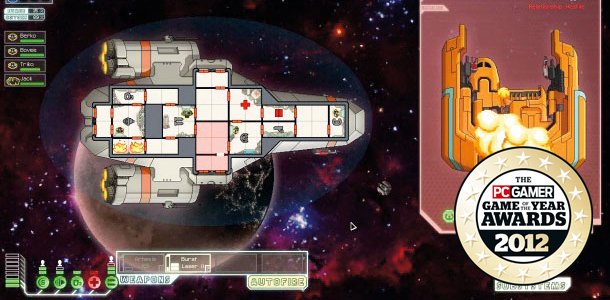The Short-form Game of the Year 2012: FTL

The fact that FTL lets me command a craft called The Space Badger with Don Draper at the helm isn't the main reason I love it (although it is a factor). Ever since I saw Firefly, I've been eager to take charge of a crew and lead them to almost certain death. FTL lets me do that, over and over again.
Your primary objective is to outrun the rebel fleet, which advances like a red wave across every sector. Dozens of jump points form an explorable web in each system. You can encounter anything from a drone guarding treasure to a planetary distress signal or a secret space shop. These quick interludes offer a short list of choices, which may result in a fight, a reward, or nothing at all.
For the first few playthroughs, these little choices formed the narrative of my ship's journey, but that novelty began to wear off as I saw the same choices repeating. Then I started to game the system. I would always ruthlessly destroy pirates even if they tried to surrender, knowing that the more resources I earned from early sectors, the better my long term chances would be. It soon became obvious that FTL isn't a game about canned stories or alien encounters, it's about survival.
Then the important decisions came to the fore. Should I spend precious resources on upgrading my energy drive? Should I repair? Should I buy fuel? FTL's upgrade systems present a fascinating ongoing conflict between the need to keep the vessel ship shape and a desire to make it better.
It helps that FTL's most devastating weapons are a joy to use. They let you sketch streaks of laser death across the hulls of your enemies. They can teleport bombs right into your enemy's engine room. They let you order drones to surgically slice up your enemy's oxygen supply. You can even see the doors on their ship opening and closing frantically as the crew dash to repair what remains of their vital systems.
Everything you can do, however, can also be done to you. FTL's campaigns are often tales of continuous, worsening crisis. Like the hero of a hardboiled detective novel, your ship becomes more battered and bruised with every encounter, limping towards the distant final boss with a naïve sense of hope.
FTL's finely balanced systems deliver great strategy, but it's in the slow demise of your craft that the game finds its drama. That it manages to do so much in such short bursts of time is remarkable.
Keep up to date with the most important stories and the best deals, as picked by the PC Gamer team.
Read More: Our FTL review and Tom F's FTL Diary .
Runners Up: Hotline Miami and Thirty Flights of Loving
Part of the UK team, Tom was with PC Gamer at the very beginning of the website's launch—first as a news writer, and then as online editor until his departure in 2020. His specialties are strategy games, action RPGs, hack ‘n slash games, digital card games… basically anything that he can fit on a hard drive. His final boss form is Deckard Cain.


